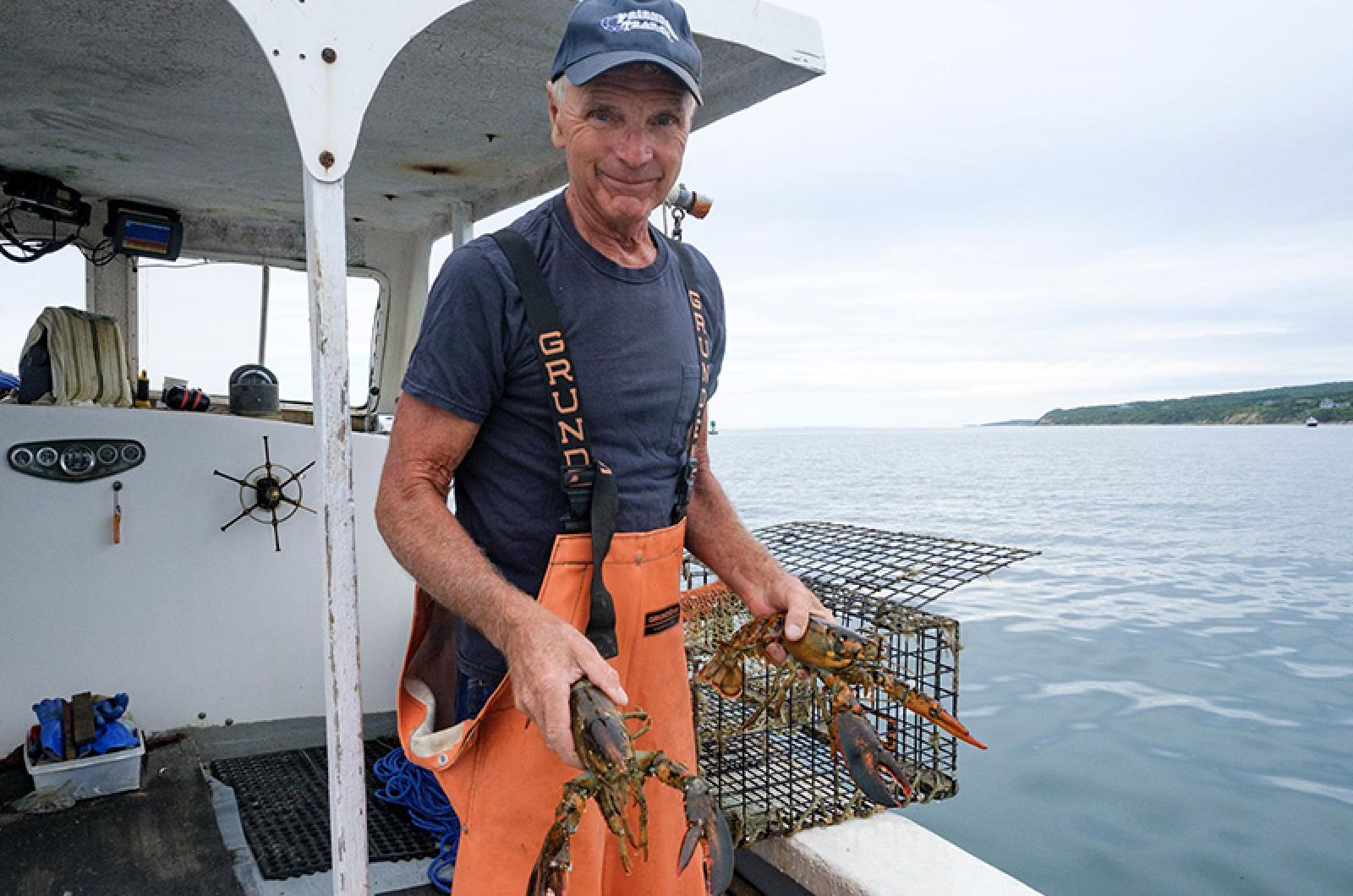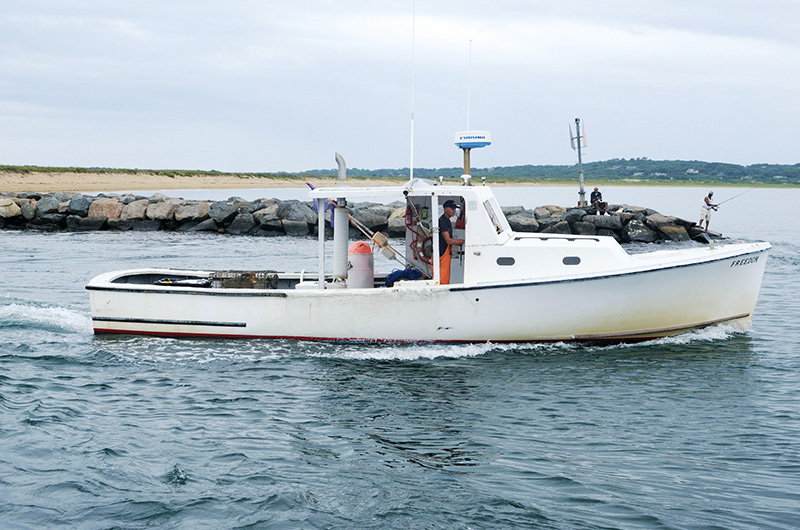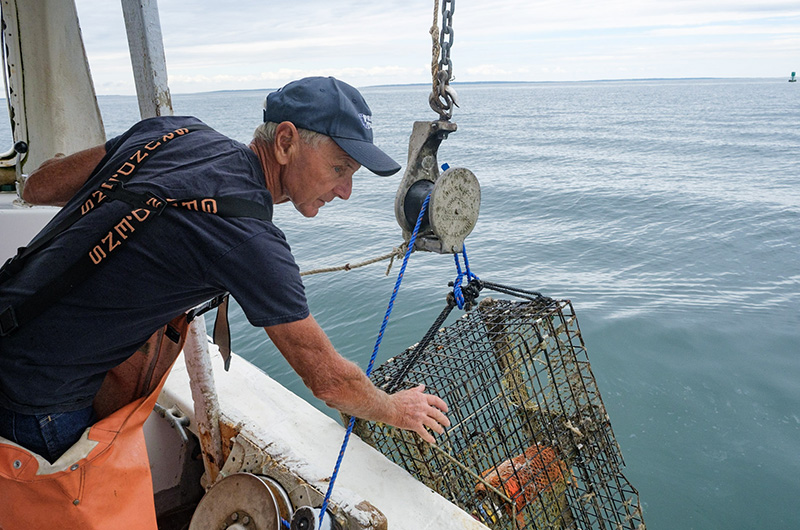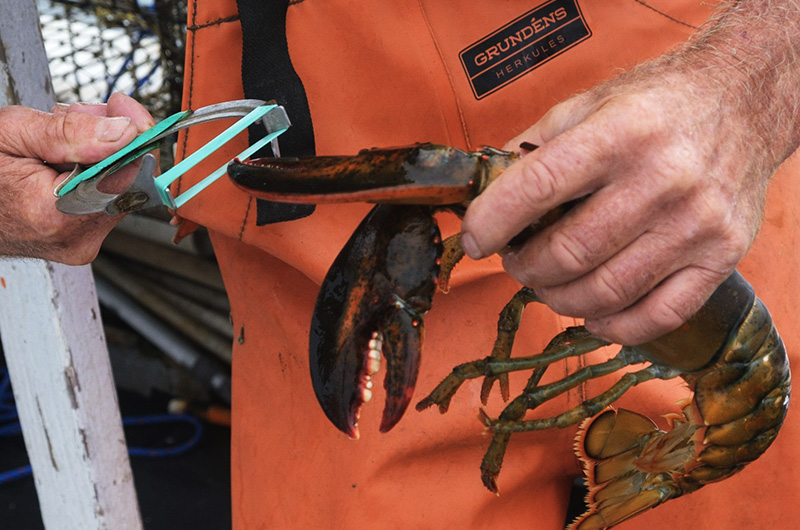It’s hard to miss Wayne Iacono as he sails out of Menemsha harbor, clad in a pair of trademark bright orange overalls, friends and fellow fishermen waving hello from the jetty. Unhurried and methodical after decades spent on the open sea, he remains one of the Island’s best known, most prolific and longest-tenured lobstermen.
It’s a status that brings a unique perspective on Island life.
“Things were much simpler in the ‘50s or ‘60s out here,” Mr. Iacono said as he piloted Freedom, the 35-foot lobster boat he has been sailing for 42 years, past the modest working boats and glossy pleasure yachts on the way toward Vineyard Sound.
The lobstering industry has changed dramatically since Mr. Iacono first began hauling traps and filling pots, and so has the technology.
“When I started, we had wooden traps,” Mr. Iacono said as he hauled out a wire trap off the coast of Aquinnah, two writhing lobsters inside. “They were made of oak and they would always be so heavy because the wood would soak up the seawater.”
Now, Mr. Iacono’s boat is decked out with radar, GPS and a fish finder that uses sonar to map the ocean floor and help lobstermen decide where to drop their traps. How did they manage before the tech?
“We used a compass and our watch,” Mr. Iacono said.
An Island resident since his family moved here in 1955, Mr. Iacono began his maritime career around the age of 12 or 13. His first boat was an eight-foot dinghy that he would row around Vineyard Haven harbor, constantly having to bail out the boat’s frequent leaks.
In the decades since, after a career in the Coast Guard that took him as far as the rivers of the Mekong Delta region of Vietnam, Mr. Iacono has always found his way home. For the last four decades, he has been a full-time lobsterman on the Island, never straying more than 35 to 40 miles offshore to drop his traps.
Mr. Iacono served in the Coast Guard for eight years. After first being placed at the Menemsha harbor base, Mr. Iacono was deployed to Vietnam in 1969, where he saw the war up close while stationed at the Advanced Tactical Support Base at Song Ong Doc, an operational base for the U.S. and Vietnamese river forces.
After he returned from service, he used the G.I. Bill to attend the University of Rhode Island and temporarily worked as the harbor master in Vineyard Haven. Mr. Iacono is still part of the Coast Guard as a member of the auxiliary, with responsibilities including standing communications watch a couple of times a week at the Menemsha Station.
In between college and his lobstering career, Mr. Iacono decided to make some extra money working on the production of a new blockbuster to be filmed on the Vineyard.
“[Steven] Spielberg used to ask me to take my boat out and get him and the crew some lobsters,” he said about his time working on the set of Jaws, where he memorably starred as the spotter on the helicopter flying over the beach, among other roles and responsibilities.
“I think the sea has always been a part of me. It’s nice to get off-shore. It’s quiet and peaceful, on the nice days anyway,” Mr. Iacono said. “On the rough days, well, sometimes it’s a long ride home.”
Over the years, Mr. Iacono has seen the environmental deterioration wrought by decades of development and pollution.
“The fishing is just not as good as it used to be; we don’t get the hauls we used to,” Mr. Iacono said, citing routinely higher tides, acidic water and more brittle shellfish as evidence of warming seas and other realities of climate change.
“We have got to make some major changes,” Mr. Iacono said, highlighting solar and nuclear energy as promising renewable energy sources needed to cut down the use of fossil fuels.
Some things don’t need to change, he said. At 75, Mr. Iacono doesn’t find himself looking toward retirement.
“I just don’t see it ending. I enjoy it,” Mr. Iacono said.










Comments (1)
Comments
Comment policy »